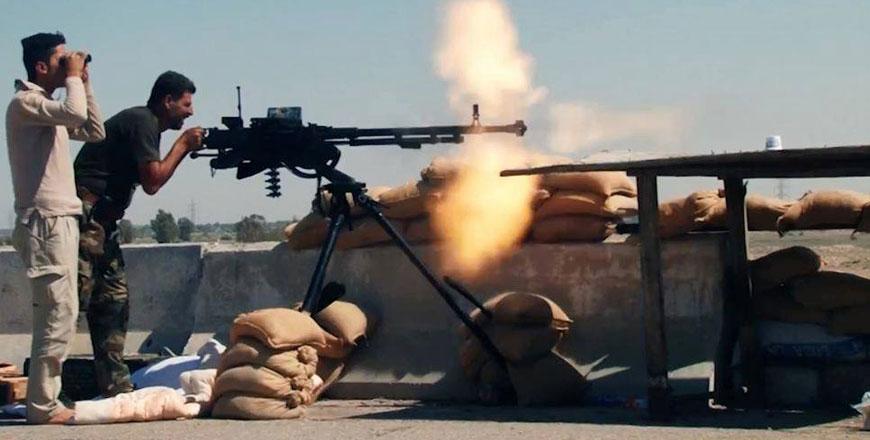You are here
Iraqi army, Shiite coalition bicker on Fallujah war operations
By Reuters - Jun 06,2016 - Last updated at Jun 06,2016

Iraqi government forces drive on a road near the village of Al Azraqiyah, northwest of the city of Fallujah, on Sunday, during an operation to regain control of the area from the Daesh terror group (AFP photo)
BAGHDAD/ERBIL, Iraq — An Iraqi Shiite militia leader accused government forces of "betrayal" as a split emerged between the Iranian-backed paramilitaries and the army over tactics for fighting the Daesh terror group.
The head of the largest militia, Hadi Al Amiri, criticised the army for moving an armoured brigade to the Makhmour area near Mosul — Daesh’s capital in northern Iraq — while the battle to dislodge the militants from Fallujah, their stronghold near Baghdad, is still underway.
"Unfortunately there is an absence of precise planning for the military operations," said Amiri, who leads the Badr Organisation. "I believe that sending a large number of armoured vehicles and assets to Makhmour, under the pretext of the Mosul battle, is a betrayal of the battle for Fallujah," he told Al Sumaria TV on Sunday.
Badr Organisation is the largest component of the Popular Mobilisation, a militia grouping which has been fighting alongside the Iraqi army at Fallujah, with government units also receiving air support from the US-led coalition.
Amiri also accused the Iraqi authorities of deciding to move the forces to Makhmour, which lies around 60km south of Mosul, under pressure from the United States.
An army spokesman denied that the build up would affect the battle for Fallujah, about 350km south of Mosul, which the militias and Iraqi government forces are trying to regain after two years of Daesh control.
The row reflects the diverging priorities of Prime Minister Haider Al Abadi — a Shiite who was elected in 2014 on a promise to mend rifts with the Sunni Muslim minority — and the Shiite militias backed by Iran.
Fallujah, which lies 50km west of Baghdad, is a historic bastion of the Sunni insurgency against the US occupation and then against the Shiite-led authorities that took over after the overthrow of Saddam Hussein, a Sunni, in 2003.
Sunni politicians fear the participation of the Shiite militias in the assault could further inflame sectarian tensions.
Historic bastion
Amiri is the second militia official to voice dismay over the Fallujah assault. On Friday, a spokesman for Asaib Ahl Al Haq, Jawad Al Talabawi, said the operations had come to a near standstill and asked Abadi to order the resumption of attacks.
Abadi said on June 1
that the army had slowed its offensive over fears for the safety of tens of thousands of civilians trapped in the city with limited access to water, food and healthcare.
Iraqi army officers confirmed that an armoured brigade had arrived on Sunday night in Makhmour. This was part of preparations for an offensive to take an airfield that they plan to use in a future offensive on the city.
Bridges and boats have also been brought to facilitate the crossing of the Tigris river from Makhmour to Qayyara, where the airfield lies, they said, giving no indication of when the battle would start.
Iraqi armed forces spokesman Brig. Gen. Yahya Rasool played down the effect of any mobilisation to capture Mosul. "I don't believe it would impact the ongoing battle of Fallujah," he told Reuters. "The forces allocated to Fallujah are achieving victories and we have started moving towards the city centre." Fallujah was the first city captured by Daesh in Iraq, in January 2014, six months before the group declared its caliphate over areas of Iraq and Syria. Abadi has expressed hope that 2016 will be the year of "final victory" over Daesh, with the capture of Mosul.
Abadi ordered the offensive on Fallujah after a series of bombings claimed by Daesh hit Shiite districts of Baghdad, causing the worst death toll this year.
His initial decision seems to have gone against the plans of his US allies, who would prefer the government concentrate on Mosul rather than risk getting bogged down in a protracted battle in a potentially hostile mainly Sunni area.
The government has already recaptured two cities from Daesh — Saddam's home town of Tikrit, and Ramadi, the capital of Iraq's vast western province of Anbar.
Related Articles
BAGHDAD — Iraq has deployed a brigade to Daesh-dominated Mosul in the north, a move criticised by Shiite militias.Mosul, a northern city tha
ERBIL, Iraq/WASHINGTON — Iraqi Shiite militia fighters are tightening a noose around the Daesh-held city of Fallujah west of Baghdad a
BAGHDAD — Iraqi forces may face a big battle near Baghdad before they can try to retake the Daesh stronghold of Mosul: Fallujah, a long-time













